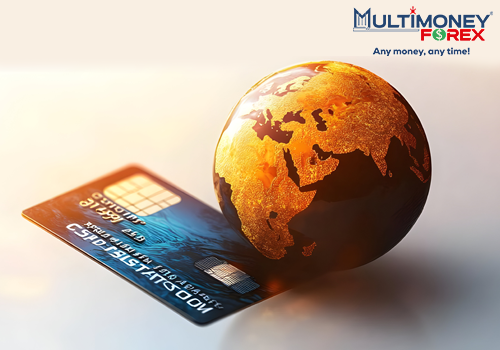Traveling abroad comes with exciting opportunities and unique challenges. One of the biggest considerations is how to carry and spend money overseas. Among the many options available, Forex Cards and Travel Cards are two popular choices for international travelers. While they may seem similar, there are important differences between the two.
What is a Forex Card?
A Forex Card is a prepaid card that you can load with foreign currency before traveling. These cards are typically issued by banks or authorized forex dealers and are designed specifically for international use. You can swipe it at POS machines, withdraw cash at ATMs, and even use it for online purchases in foreign currencies.
Key Features:
- Preloaded with one or multiple foreign currencies
- Locked-in exchange rates at the time of loading
- Widely accepted at global VISA or MasterCard networks
- Minimal currency conversion charges
What is a Travel Card?
A Travel Card is a broader term that includes any prepaid, debit, or credit card used while traveling. While it may function similarly to a Forex Card, it often comes with more flexibility and broader acceptance. Travel cards can be either prepaid in INR or other currencies and may include additional travel perks and benefits like insurance, cashback, or lounge access.
Key Features:
- Can be prepaid, debit, or credit cards
- Loaded in INR or foreign currencies
- Currency conversion may happen at the time of the transaction
- Often comes with added travel benefits
Forex Card vs Travel Card: Key Differences
| Feature | Forex Card | Travel Card |
| Currency | Preloaded with foreign currency | Preloaded in INR or foreign currencies |
| Exchange Rate | Locked at the time of loading | Variable; depends on market rate |
| Usage | Best for international spending | Usable both in India and abroad |
| Conversion Charges | Lower or zero conversion fees | Higher or live exchange rates apply |
| Reload Options | Reloadable online or at banks | Reloadable, but may take longer |
| Acceptance | Global (VISA/MasterCard) | Global (some may be restricted) |
| ATM Withdrawals | Available with a nominal fee | Available with potentially higher fees |
| Security | High, with PIN and chip protection | Varies depending on card type |
| Additional Perks | Limited | May include rewards, insurance, etc. |
Advantages of Using a Forex Card
- Locked-in Exchange Rates: Protects against forex fluctuations.
- Multi-currency Option: Ideal for multi-country trips.
- Cost-effective: Minimal or no cross-currency conversion charges.
- Safer than Cash: PIN-protected and replaceable if lost.
- Easy Reloading: Can be recharged online or through a bank.
- Track Spending: Real-time transaction updates via SMS or app.
Advantages of Using a Travel Card
- Flexibility: Can be used for both domestic and international travel.
- Rewards & Offers: Many credit or prepaid travel cards offer cashback, miles, and travel insurance.
- Lounge Access: Some travel credit cards offer complimentary access to airport lounges.
- Emergency Support: 24/7 customer service and emergency cash support.
- Convenience: No need to carry multiple currencies or cards.
Which One Should You Choose?
Choose a Forex Card if:
- You want fixed exchange rates with no surprises.
- You’re traveling to one or more foreign countries and want to avoid extra charges.
- You’re looking for a budget-friendly and secure option.
- You prefer to load exact foreign currency in advance.
Choose a Travel Card if:
- You want a multi-purpose card for domestic and international use.
- You travel frequently and want rewards or perks.
- You prefer the convenience of one card for all expenses.
- You’re not concerned about live exchange rates.
Tips for Using Cards Abroad
- Notify Your Bank: Inform the issuer about your travel dates and destination.
- Carry Backup: Always carry an extra card or some cash.
- Check Fees: Know the ATM withdrawal and reload fees.
- Enable SMS Alerts: Helps you track spending and spot suspicious activity.
- Keep Emergency Numbers Handy: For card blocking or support.
Both Forex Cards and Travel Cards serve specific travel needs, and the right choice depends on your travel style, destination, and financial goals. A Forex Card is ideal for those who want to lock in rates and manage a fixed budget.
A Travel Card, on the other hand, offers flexibility and added perks for frequent flyers. Evaluate your needs, compare charges, and select the card that aligns best with your travel plans.
FAQs:
1. Is a Forex Card better than a Travel Card?
It depends on your needs. A Forex Card offers locked exchange rates and lower fees, while a Travel Card offers more flexibility and travel benefits.
2. Can I use a Forex Card in multiple countries?
Yes, if it’s a multi-currency card. Make sure to load the required currencies in advance.
3. What happens if I lose my Forex or Travel Card abroad?
You can block the card immediately through customer service and request a replacement or emergency cash assistance.
4. Are there any hidden charges in using these cards?
Forex Cards usually have lower hidden charges. However, always check for ATM fees, reload charges, and inactivity fees.
5. Can I use a regular debit/credit card instead?
You can, but it often involves higher foreign transaction fees and less security compared to Forex or Travel Cards.


